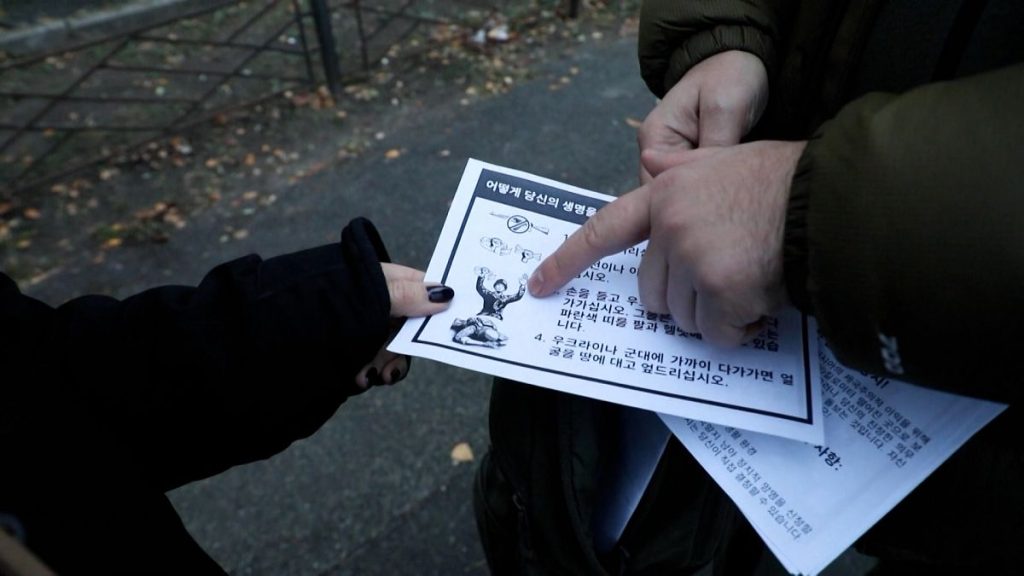The ongoing conflict between Russia and Ukraine has taken a new dimension with the reported involvement of North Korean troops, prompting a unique counter-offensive from Ukrainian intelligence. Beyond traditional military tactics, Ukraine has launched a psychological operation aimed at inducing desertion among North Korean soldiers fighting alongside Russian forces. This initiative, dubbed the “I Want to Live” project, leverages leaflets and online videos to highlight the stark contrast between the hardships of life in North Korea and the potential for a better future elsewhere. The project, initially targeting Russian soldiers reluctant to participate in the war, has now expanded its scope to address the estimated 10,000 North Korean troops deployed in Russia’s Kursk border region. This innovative approach reflects Ukraine’s recognition of the unique vulnerabilities presented by the North Korean contingent and their potential susceptibility to appeals for defection.
The “I Want to Live” project represents a multi-pronged approach to psychological warfare. Utilizing both physical leaflets dropped behind enemy lines and online videos disseminated through various channels, the campaign aims to reach North Korean soldiers with its message of hope and opportunity. The leaflets provide practical instructions on how to safely surrender to Ukrainian forces, emphasizing the humane treatment they can expect. The online videos likely expand on these themes, potentially showcasing testimonials from former North Korean defectors who have successfully integrated into new societies. This combination of practical guidance and emotional appeal seeks to create a compelling narrative for North Korean soldiers considering desertion. It capitalizes on the pre-existing discontent within the North Korean ranks, stemming from the repressive nature of the regime and the bleak economic prospects for ordinary citizens.
The decision to target North Korean soldiers specifically underscores Ukraine’s understanding of the geopolitical dynamics at play. North Korea’s involvement in the conflict, while bolstering Russia’s manpower, simultaneously introduces a potential point of weakness. Unlike Russian soldiers, who may have a more nuanced understanding of the conflict, North Korean troops are likely operating under strict orders and with limited information about the outside world. Their motivation for fighting may be primarily based on loyalty to the regime or fear of reprisal, rather than a genuine belief in the war’s cause. This makes them particularly susceptible to messages that challenge their existing worldview and offer a viable alternative to continued service.
The “I Want to Live” project builds upon the earlier successes of the initiative in encouraging defections among Russian soldiers. Since its inception in 2022, the project claims to have facilitated the surrender of 350 Russian soldiers. This prior success demonstrates the effectiveness of the project’s messaging and the underlying desire among some combatants to escape the conflict. While the cultural and linguistic differences between North Korean and Russian soldiers will necessitate adjustments to the campaign’s content and delivery, the core principles remain the same: offering a safe passage to freedom and a chance at a better life.
The underlying assumption behind the project is that many North Korean soldiers view their deployment in Ukraine not as a patriotic duty but as a desperate attempt to escape the oppressive conditions back home. The “I Want to Live” project capitalizes on this sentiment by offering a concrete path towards achieving this goal. By emphasizing the stark contrast between the hardships of life in North Korea and the potential for a new life elsewhere, the project seeks to sow seeds of doubt and inspire hope among the North Korean ranks. The prospect of escaping the Kim regime’s authoritarian rule, coupled with the promise of improved living conditions and personal freedoms, provides a powerful incentive for defection.
The long-term effectiveness of the “I Want to Live” project in influencing North Korean troop behavior remains to be seen. The project faces several significant challenges, including the tightly controlled information environment within North Korea and the potential for severe repercussions against soldiers caught communicating with the enemy. However, the very existence of the project represents a creative and potentially disruptive element in the ongoing conflict. By targeting the psychological vulnerabilities of a key component of Russia’s military alliance, Ukraine is attempting to gain an advantage beyond the traditional battlefield. The success of this endeavor could significantly impact the course of the war and the future of North Korean involvement in international conflicts.














